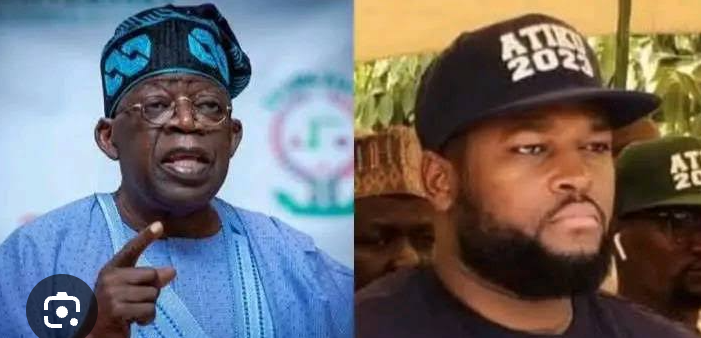
Suspend the Coastal Road, Save the Country? — Atiku’s Son Sparks Fierce Nationwide Debate with Bold Message to President Tinubu
Nigeria’s conversation around national priorities took a sharp turn this week after Shehu Abubakar, son of former Vice President Atiku Abubakar, publicly urged President Bola Ahmed Tinubu to suspend the ongoing Lagos–Calabar Coastal Road project and redirect its massive funding toward tackling the country’s deepening insecurity crisis. His statement, made
Nigeria’s conversation around national priorities took a sharp turn this week after Shehu Abubakar, son of former Vice President Atiku Abubakar, publicly urged President Bola Ahmed Tinubu to suspend the ongoing Lagos–Calabar Coastal Road project and redirect its massive funding toward tackling the country’s deepening insecurity crisis. His statement, made via X (formerly Twitter), ignited an intense wave of reactions online, reflecting the nation’s growing frustration, fear, and desire for pragmatic governance in the face of widespread violence.
Shehu didn’t mince words. In his post, he stated, “If the President is serious, he should suspend the work on Coastal road, and rechannel those funds to solving insecurity in the country.” The message, which quickly went viral after being reposted by Instablog9ja, questioned the rationale behind prioritizing infrastructure at a time when Nigerians in many regions live under the constant threat of attacks, kidnappings, and insurgent activities. Instablog’s caption summed up the sentiment circulating among many citizens: “What’s the point of the roads if people aren’t safe driving on them?”
The Coastal Road project, one of the Tinubu administration’s flagship infrastructural undertakings, has been promoted as a strategic investment expected to boost tourism, enhance trade, create jobs, and link major economic corridors across states. But for critics like Shehu Abubakar, the project represents the wrong priority at a time when Nigeria’s security challenges have escalated to alarming levels. From mass abductions in the North-West to attacks on villages in the Middle Belt and rising cult-related killings in the South, many observers argue that the nation is in urgent need of a targeted, well-funded, and coherent security overhaul.
Shehu’s comments touched a nerve because they mirrored a question millions of Nigerians quietly ask every day: How can development thrive when insecurity keeps citizens in fear? His intervention was not merely political; it was an emotional reflection of a country exhausted from the recurring tragedies that disrupt daily life. For many Nigerians, development means little if they cannot safely travel, farm, work, worship, or even sleep in their own homes without fear of violence.
As expected, his remark immediately polarized opinions. Supporters applauded his boldness, insisting that he voiced what many public officials are afraid to say. They pointed to the spiralling insecurity that has claimed thousands of lives, crippled local economies, discouraged investors, and forced entire communities to flee their ancestral homes. These Nigerians argue that safety is the foundation of national progress, and any government that prioritizes roads, ports, and railways above human lives risks losing touch with the people it serves.
On the other side, defenders of the Coastal Road project argue that security and development must go hand in hand, not be treated as mutually exclusive. Some supporters of the Tinubu government noted that canceling or suspending such a massive project would create economic setbacks, job losses, and instability in the construction sector. They also pointed out that infrastructural expansion is a long-term solution that can itself reduce insecurity by improving access, spreading economic opportunities, and empowering coastal communities.
Still, even those in support of the project acknowledged that the President must demonstrate stronger leadership in addressing insecurity, which remains one of the country’s most persistent national challenges. Many argued that the issue is not simply about relocating funds but about restructuring the entire security architecture — from intelligence gathering to military funding, police reforms, local vigilante integration, and community-based conflict resolution.
Shehu Abubakar’s statement also triggered political interpretations. Some saw his comments as an indirect jab from the opposition, given Atiku Abubakar’s long-standing political rivalry with President Tinubu. Critics accused Shehu of exploiting national issues to score points for his father’s political camp. However, others pushed back, arguing that Nigeria’s insecurity crisis is far too serious to be reduced to partisan squabbles. They insisted that every voice — regardless of political affiliation — must be welcomed if it contributes to the national discourse.
What remains undeniable is that Shehu’s comment reignited a much-needed conversation about priorities, governance, and the real meaning of development. Nigerians from different regions took to X, Facebook, WhatsApp groups, and community forums to share stories about how insecurity directly affects their lives. Parents expressed fear over sending children to school. Farmers lamented abandoning farmlands due to bandits. Traders spoke about unsafe roads that have turned night travel into a high-risk gamble. For many, the Coastal Road is a beautiful dream — but one that feels distant when the present reality is filled with danger.
The situation has become even more pressing as high-profile attacks continue to dominate headlines. Cases like the Eruku church kidnapping in Kwara State, highway abductions across Kaduna and Niger, and recurring raids in Plateau have made Nigerians feel increasingly vulnerable. The call to prioritize security funding echoes louder with every fresh report of violence.
As social media continued to buzz, some Nigerians challenged the government to prove that the nation’s security situation is truly under control before investing in grand projects. Others reminded the public that insecurity has roots in poverty, unemployment, weak institutions, and porous borders, insisting that the solution must be multidimensional.
Yet, Shehu Abubakar’s message cut through all that complexity with a simple, powerful question: What is the value of a road if people cannot travel on it safely? His words resonated because they captured a painful reality — that development without security feels hollow.
For now, the Presidency has not issued an official response to Shehu’s remarks, but insiders suggest that the administration remains firm in its commitment to completing the Coastal Road, which it sees as a transformational economic project. Whether this debate will influence policy decisions remains to be seen, but one thing is clear: Nigerians are demanding more transparency, stronger security strategies, and policies that reflect their immediate concerns.
The uproar shows the growing impatience among citizens who are no longer satisfied with promises or political speeches. They want safety, stability, and practical solutions — and they want them now.
In the end, Shehu Abubakar’s viral comment has become more than a political statement; it has become a mirror reflecting the heart of Nigeria’s dilemma: a nation striving for modernization while battling the insecurity that threatens to overshadow its progress. The debate he sparked will likely continue, and perhaps it will push leaders to rethink not just the Coastal Road project but the broader question of what truly drives national development in a country yearning for peace.
Share this post
Related Posts

\"Never Been Rejected\": Damson Idris Drops Dating Bombshell That Has Everyone Talking
British-Nigerian actor Damson Idris has sent social media into a frenzy with a bold claim...

\"Signed, Sealed, Still Empty?\": Woman’s Fiery Clapback to Married Friend Sparks Online Buzz
In a social media post that’s now making the rounds with thousands of reactions, shares,...

“We Thought We Were Starting a New Life”— Lady Breaks Down in Tears as She Recounts How She and Her Friend Were Robbed, Assaulted, and Nearly Raped in Their New Apartment
A young Nigerian lady has taken to social media to recount a harrowing experience that...